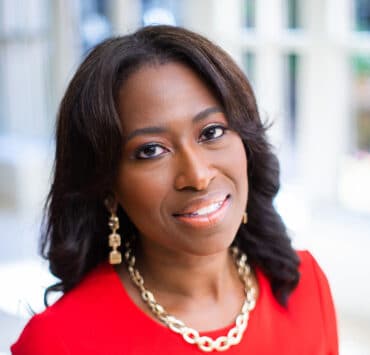HR leaders and project managers must solve complex business problems and demonstrate advanced technical expertise, but Rebecca Gristina understands what’s really important—people and family. She left the workforce when her family needed her most. The experience changed the way she leads her team and designs benefits at the University of Virginia.
After graduating from Western Michigan University, Gristina took an entry-level position in a financial services call center, where she was on a very clear career path. She knew exactly what skills she needed to obtain and milestones she needed to meet to transition to higher-level roles. After a few years and several promotions, she was designing retirement plans, leading enrollment meetings, and learning how the HR function helps drive an entire organization.
Although her career was flourishing, it required Gristina to be on the road and away from her family. Back home, her children faced several medical-related challenges. One daughter developed an autoimmune disease. Her son received an autism diagnosis. “It’s popular to talk about a good work/life balance, but the reality is we can easily let work take over at the expense of life unless we’re very careful,” she says. Gristina decided to leave the career that she loved to focus on her family.
In 2016, Gristina’s situation started to change. Her youngest child entered school full-time, and her family had settled into a rhythm to partner with care providers and manage autism well. She was ready to reenter the workforce.
As she met with teams and managers, Gristina explained her skills and qualifications. She talked passionately about her difficult decision to walk away from a promising career. And in doing so, she convinced leaders to hire her as a compliance specialist at the University of Virginia Physicians Group. She later became a benefits specialist for the university. Since 2018, Gristina has been designing and implementing programs as the university’s benefits director.
The public research university in Charlottesville, Virginia, has nearly 30,000 employees across its schools and health system. Gristina draws heavily on her life experience as she leads her team and designs benefits for this large, varied, and influential population. “I used to be embarrassed by the twelve-year gap in my résumé, but now I embrace it,” she explains. “The experience changed me and made me into a vulnerable leader.”
That’s especially valuable now in a post-pandemic world, when many HR associates and university employees are dealing with issues similar to those Gristina once managed in her own personal life. Those colleagues are balancing the demands of a career with increasing child care, elder care, and remote learning needs. These issues contribute to higher stress and burnout. The Kaiser Family Foundation says that one in ten women reported quit a job because of the pandemic. Thirty percent have taken more time off (some without pay) because of school or daycare closures. More than half of all women say the situation has negatively impacted their mental health, but few have sought professional mental health care.
While Gristina did the day-to-day work of streamlining and improving her function by optimizing a newly implemented human resource information system to limit manual interventions, the new realities employees face compelled her to make a change in strategy. She initiated a survey to “take the pulse” of university employees and understand how her team could supply the new resources they now need.
In response to closures related to COVID-19, the University of Virginia implemented Aetna’s Teladoc Telehealth services as an alternative to urgent care. Growth in telehealth usage immediately peaked. The UVA health plan telemedicine utilization for primary care visits and outpatient care increased by five hundred-fold from the previous year. The system also improved employee access to behavioral and mental health providers.
Gristina and her team also worked behind the scenes to help employees manage the complex world of the federal Family Medical Leave Act (FMLA). The benefits team partnered with Unum, its vendor for disability insurance, to manage the day-to-day administration and compliance with the FMLA. By outsourcing leave administration, UVA benefits counselors could spend time supporting employees through the leave process, addressing health plan benefits when necessary.
In 2022, Gristina is focused on improving the university’s value proposition for prospective employees. She’s also lobbying her counterparts in recruiting to find unconventional talent like her. “The pandemic has helped us see that there is a lot of talent we can tap into out there. We just have to look in unique places to find it,” she says.
This all comes on the heels of a system-wide HR transformation that introduced a new robust technology platform. The department now has all the tools in place to identify, onboard, and retain the top talent that will take the University of Virginia into the future.
Rebecca, we, at Unum, are thrilled to see this recognition of your impressive work as an HR leader. We are inspired by your strategic vision for the employee experience at UVA. We are proud to work together to deliver cutting-edge benefits and transformative technology that improves processes and delivers value across your organization.


